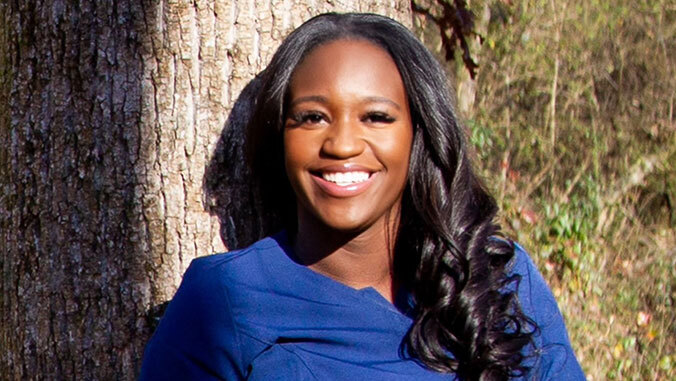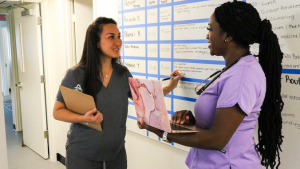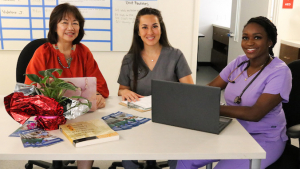
University of Hawaiʻi at Mānoa student Yasmeen LaTore has been named by The Institute for Human Services (IHS) to lead the ʻImi Ola Piha Homeless Triage Center as program manager, helping Oʻahu homeless patients to ‘seek one’s fullest life’ when doors open in early April, while completing her doctor of nursing practice (DNP) at the Nancy Atmospera-Walch School of Nursing (NAWSON). Focal to her capstone DNP project, is developing a training program module for onboarding new health services staff at IHS.

Since 2018, LaTore’s caring nature has prompted her to integrate her nursing education into various roles at IHS, supporting patients to manage their mental illness and substance abuse, providing COVID-19 care and serving as community liaison nursing for recently housed individuals. As lead for the new triage center, the first of its kind in the state, LaTore will be managing community-based medication-assisted detox for substance withdrawal. She will help initiate psychiatric treatment that are considered best practice with unsheltered chronically homeless when their situational circumstances are considered.
LaTore started at NAWSON as a student in the Graduate Entry Nursing Program (GEPN), a post-baccalaureate program that provides a seamless pathway for non-nursing degree students to earn either their master of science in nursing (MSN) or DNP.
“IHS truly has a heart for these incredibly vulnerable persons, and we’ve put careful consideration into building a team of professionals to provide quality medical and behavioral health care to help these patients begin their journey of healing,” said Latore. “I feel so fortunate to be a part of this wonderful team and to help these patients ‘seek one’s fullest life’—ʻImi Ola Piha.”
Training standard for building cultural sensitivity
In developing her training module, LaTore worked closely with fellow NAWSON alumnae, IHS Executive Director Connie Mitchell (BSN, MSN), a 2016 UH Mānoa Nursing Hall of Fame honoree, and IHS Chief Administrative Officer Leina Ijacic (BSN).
Yasmeen’s training module has become a standard for enhancing cultural sensitivity when working with people experiencing homelessness
—Connie Mitchell
“Yasmeen’s training module has become a standard for enhancing cultural sensitivity when working with people experiencing homelessness,” said Mitchell. “We are so much more effective at engaging people in managing their own health, when we are attuned to their feelings and priorities while living unsheltered or experiencing housing instability.”
LaTore agreed that individuals experiencing homelessness have unique challenges accessing and implementing treatment. She said, “As a new nurse providing care for this vulnerable population, I realized that healthcare staff often don’t learn about or make adaptations to practice that can improve the outcomes of care afforded to homeless patients. My DNP project aims to fill that gap in knowledge and provide additional training to providers. Bias, judgment and discrimination are commonly cited reasons for homeless persons neglecting care.”
In addition to new staff, including nurses, physicians, counselors and case managers, the training will also be used for students who come to IHS for their internship experiences.
LaTore is hopeful through this new training standard that homeless patients will feel seen and cared for, and that providers make modifications to account for the practical challenges due to the experience of homelessness.
Formative experiences at NAWSON
LaTore will earn her DNP in August and participate in the spring commencement ceremony. She is thankful for the experiences NAWSON has afforded her.
“As a GEPN student, I had no previous nursing experience, I can vividly recall being nervous to take a patient’s blood pressure,” said LaTore. “The education I received at NAWSON and its supportive faculty members has equipped me with the nursing care and clinical decision making skills that have allowed me to operate at the highest level of the nursing scope of practice.”

Ijacic, who constantly seeks to resource innovations in her role at IHS for the last three years, said “My UH nursing education provided the foundation for the decisions I make daily. My senior capstone project covered clinical quality improvement and patient safety. It taught me about the administration of running a healthcare facility. The hands-on clinical training exposed me to the major healthcare systems in Hawaiʻi, the importance of culturally competent care and how programs work best when we tailor them for our Hawaiʻi community.”
Mitchell, who has led IHS for nearly 17 years, also credits her UH Mānoa nursing experience for shaping the way she approaches life.
“It [nursing education at NAWSON] has served me well throughout my professional life, no matter where I found myself. I often remember the challenge imparted to me by one of my instructors about not only caring for individual patient needs, but to offer leadership when opportunities arise to shape the health of our community,” she said. “I’m reminded of that challenge everyday at IHS, whether we’re provide access to basic needs like food, hot showers, and a safe place to sleep; or when we fight for access to mental health treatment at the Legislature for those who can’t do so themselves, or when we’re advocating for changes in practice standards with health plans or government policy makers.”
Learn more about NAWSON’s programs.
—By Arlene Abiang

